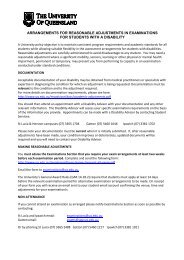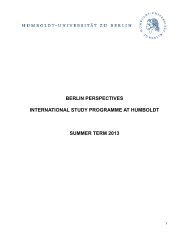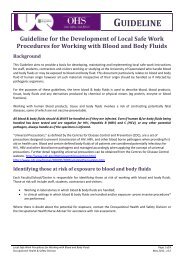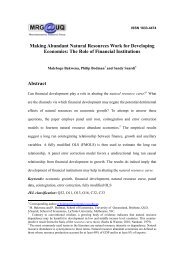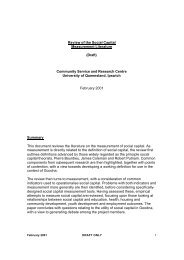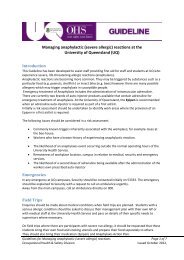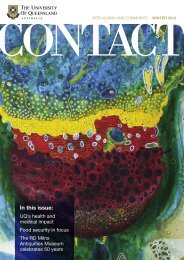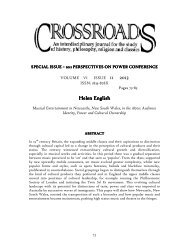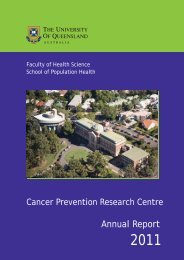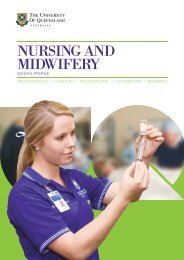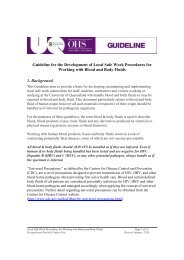Managing Traffic Incidents - University of Queensland
Managing Traffic Incidents - University of Queensland
Managing Traffic Incidents - University of Queensland
You also want an ePaper? Increase the reach of your titles
YUMPU automatically turns print PDFs into web optimized ePapers that Google loves.
(Continued from page 19)<br />
There have been many more examples<br />
throughout my fortunate career which illustrate<br />
a continuum <strong>of</strong> interaction and pr<strong>of</strong>essional<br />
development, but practical limitations<br />
dictate that I not list them all. However, 2<br />
which arose during the 6 years in which I<br />
was privileged to serve as Chief Engineer <strong>of</strong><br />
Main Roads warrant mention here:<br />
i. I was asked to establish and lead a team <strong>of</strong><br />
pr<strong>of</strong>essionals for the purpose <strong>of</strong> defining<br />
and implementing a system <strong>of</strong> performance<br />
assessment <strong>of</strong> engineers and technicians<br />
throughout the Department (to be<br />
applied to about 700 technically qualified<br />
staff). Implementation <strong>of</strong> this system was<br />
initiated among the Senior Management<br />
Team before we cascaded it down through<br />
the ranks. This gave me the opportunity to<br />
experience first hand a pr<strong>of</strong>essional approach<br />
for setting <strong>of</strong> objectives for my<br />
own responsibilities and subsequent assessment<br />
<strong>of</strong> their achievement in a positive<br />
way with my own superior - and then<br />
with my subordinates (all senior <strong>of</strong>ficers<br />
<strong>of</strong> high calibre).<br />
ii. On my own initiative I arranged for a<br />
team <strong>of</strong> pr<strong>of</strong>essionals to assist me in defining<br />
a document which enunciated the<br />
attitudes and policies <strong>of</strong> Main Roads in<br />
development <strong>of</strong> its graduate engineers;<br />
respective responsibilities for the graduates,<br />
their superiors and for the Department<br />
itself were defined - the concept <strong>of</strong><br />
mentoring was recognised in this and<br />
guidelines for its performance were denied.<br />
Now what does this all mean? I have no<br />
doubt that my fortunate career did not just<br />
happen (by accident). Those responsible for<br />
my activities always made themselves available<br />
to encourage me and to guide my development.<br />
It was clear that I was given "lots <strong>of</strong><br />
rope", but never left in a position whereby "I<br />
might hang myself". It needs to be recognised<br />
that opportunities for development and<br />
career advancement were there to be taken<br />
up - I did not have to grasp them, but the environment<br />
in which I operated gave me the<br />
confidence to "have a go".<br />
On reflection, if there was one ingredient<br />
missing in the early days <strong>of</strong> my fortunate<br />
career it was that these principles and attitudes<br />
were not expressed and openly discussed<br />
- they were just applied.<br />
When we realise that the fundamental responsibility<br />
for a pr<strong>of</strong>essional engineer's development<br />
rests with him or herself, we<br />
might be excused for saying that we don't<br />
need to have these things written down and<br />
talked about. Nevertheless, my own experience<br />
tells me that the potential <strong>of</strong> any pr<strong>of</strong>essional<br />
engineer is more likely to be realised<br />
if the principles and attitudes relevant to pr<strong>of</strong>essional<br />
development are documented and<br />
discussed with him/her. I draw a parallel<br />
here with experience in the latest phase <strong>of</strong><br />
my fortunate career - as a specialist consultant<br />
in quality management : the very action<br />
<strong>of</strong> documenting the processes involved in<br />
any significant activity leads to better understanding<br />
<strong>of</strong> them and initiates improvements.<br />
Some final words <strong>of</strong> advice: as you go<br />
about defining how you will achieve all <strong>of</strong><br />
the ideas set out so well by Pr<strong>of</strong>essor Charles<br />
in his article, make sure the following 2 dimensions<br />
are clearly defined in your plan<br />
and your tactics for its implementation:<br />
– be clear on your own responsibility for<br />
your pr<strong>of</strong>essional development - if you<br />
don't see it this way, others who do will<br />
gallop past you; and<br />
– seek out a mentor who you can rely upon<br />
and confide in - this may be your boss,<br />
but doesn't have to be; you may even need<br />
a series <strong>of</strong> mentors over the first years <strong>of</strong><br />
your career; the key is to consciously and<br />
earnestly make this happen. !<br />
Contact Trevor Parminter by email :<br />
tparmin@tpgi.com.au<br />
20 DECEMBER 2001


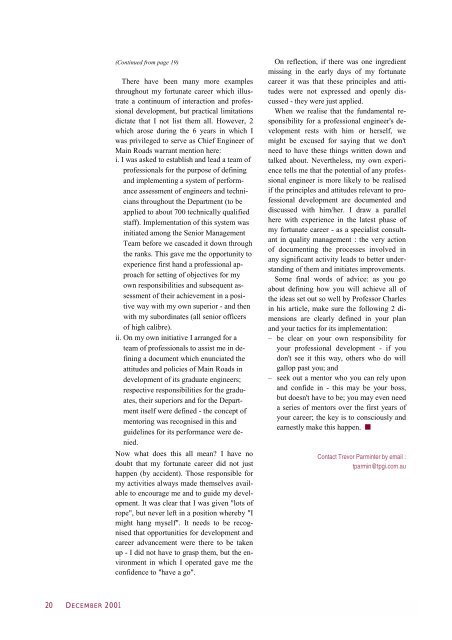
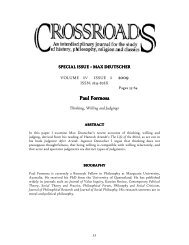
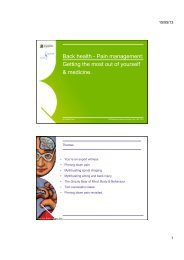
![Recycling [ PDF, 62KB ] - University of Queensland](https://img.yumpu.com/51805185/1/184x260/recycling-pdf-62kb-university-of-queensland.jpg?quality=85)
